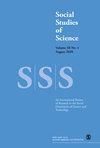即兴专家:在经合组织核能机构福岛研讨会上树立权威
IF 2.7
2区 社会学
Q1 HISTORY & PHILOSOPHY OF SCIENCE
引用次数: 0
摘要
近年来,全球各地都对专家权威危机表示担忧。日本也不例外。围绕 2011 年福岛第一核电站灾难管理(失误)的丑闻严重损害了公众对国家机构的信心,给从事辐射防护的人员带来了额外的挑战。本文探讨了在公众信任度较低的情况下,如何对专家权威提出要求。为此,我对经合组织核能机构(NEA)的事故后食品安全科学研讨会进行了人种学描述--该研讨会是应日本内阁办公室的要求举办的,旨在激发人们对福岛农产品的信心。我分析了组织者利用戏剧即兴创作的成语精心打造可信公众形象的做法;提请人们注意他们在应对公共理性危机时改编现有机构脚本的 "表演机智"。具体而言,即兴表演让我们思考核政策参与者如何以及为何试图划分赤字模式的两种变体:"辐射恐惧症 "的(心理)话语和 "声誉损害 "的(经济)话语。以往的学术研究已经指出了这两种论述之间的连续性,而对这一边界工作的关注则揭示了 "名誉损害 "相对于 "辐射恐惧症 "的戏剧性优势,它可以反驳批评者对受害者称号的诉求,确保国际支持,并使专家的身体成为一个证据场所。本文章由计算机程序翻译,如有差异,请以英文原文为准。
The improvised expert: Staging authority at an OECD Nuclear Energy Agency workshop in Fukushima
In recent years, concerns about a crisis of expert authority have been expressed across the globe. Japan is no exception to this trend. Scandals surrounding the (mis)management of the 2011 Fukushima Daiichi nuclear power plant disaster severely damaged public confidence in state institutions, posing an additional challenge for those engaged in radiological protection. This article examines how claims to expert authority are made in these conditions of low public trust. To this end, I offer an ethnographic account of the OECD Nuclear Energy Agency’s (NEA) Workshop on Post-Accident Food Safety Science—an event staged at the request of the Japanese Cabinet Office with the aim of inspiring confidence in Fukushima produce. I analyse the practices through which the organizers craft a credible public persona using the idiom of dramaturgical improvisation; drawing attention to the ‘performed resourcefulness’ with which they adapted extant institutional scripts in response to a discerned crisis of public reason. Concretely, improvisation invites us to consider how and why nuclear policy actors have sought to demarcate two variants of the deficit model: the (psychological) discourse of ‘radiophobia’ and the (economic) discourse of ‘reputational damage’. Where prior scholarship has identified the continuities between the two discourses, an attention to this boundary work reveals the dramaturgical advantages of ‘reputational damage’ over ‘radiophobia’ in contesting critics’ claims to the mantle of victimhood, securing international support, and producing the expert’s body as a site of evidence.
求助全文
通过发布文献求助,成功后即可免费获取论文全文。
去求助
来源期刊

Social Studies of Science
管理科学-科学史与科学哲学
CiteScore
5.70
自引率
6.70%
发文量
45
审稿时长
>12 weeks
期刊介绍:
Social Studies of Science is an international peer reviewed journal that encourages submissions of original research on science, technology and medicine. The journal is multidisciplinary, publishing work from a range of fields including: political science, sociology, economics, history, philosophy, psychology social anthropology, legal and educational disciplines. This journal is a member of the Committee on Publication Ethics (COPE)
 求助内容:
求助内容: 应助结果提醒方式:
应助结果提醒方式:


